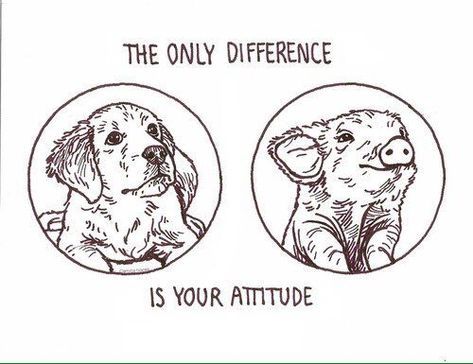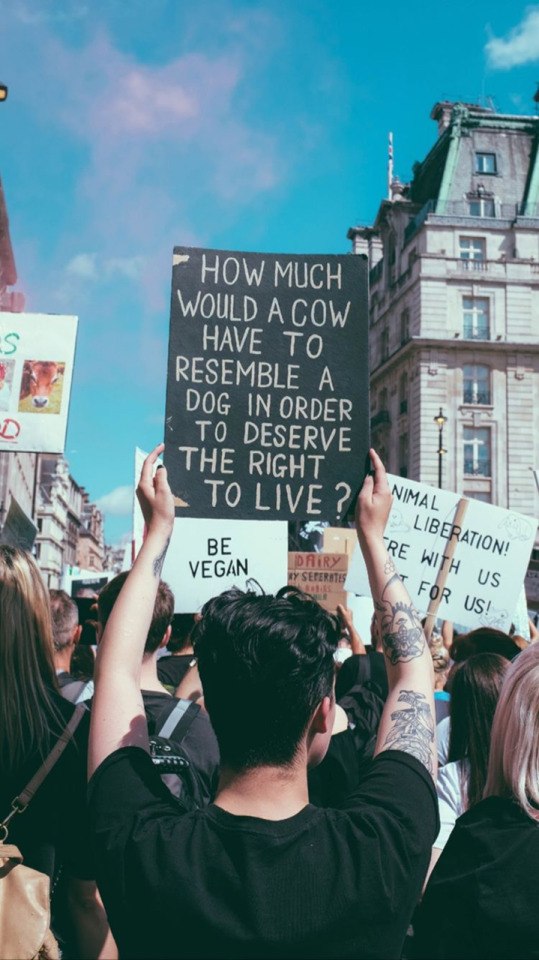Text
“The greatest ethical test that we’re ever going to face is the treatment of those who are at our mercy.”
— Lyn White
137 notes
·
View notes
Photo

Every creature wants to live, no matter the species. We all desire love, comfort, and happiness. We really aren’t so different after all.
938 notes
·
View notes
Text
When I was 17, I took a philosophy class in high school and wrote about animal rights. Thought I'd share my essay here because why not?
Ethically, people should not eat animals or harm them in any way. Consuming and abusing an (non-human) animal is morally wrong. Animals and humans should share the same rights because animals are equal to humans, have similar qualities and the love one feels for animals should be respected. A clear sense of morality is one that does not advocate abusing creatures of the Earth, even if it is advantageous for another human being. Many people see animals as a primary source of food, entertainment, and fashion; but, if animals do not have a choice as to whether or not they would like to participate in such monstrosities, is it morally right for humans to make the choice for them?
Animals are equal to humans, and should therefore be treated in the same way humans treat each other. Animals are not just material, they have a soul. According to a philosopher by the name of Pythagoras, animals and humans share a parallel soul; it is the duty of humans to respect animals because, if they ultimately choose to exploit an animal, humans are essentially exploiting their relative. (Honderich) Humans have a right to live freely, without fear; animals should also be allowed to have this right because humans are essentially animals, and if humans are animals, then wild animals should have treatment equal to humans. A similar soul should equal a similar, fair outcome; if there is no fair outcome, there is no fairness at all.
As long as humanity continues to be the ruthless destroyer of other beings, we will never know health or peace. For as long as people massacre animals, they will kill each other. Indeed, he who sows the seed of murder and pain cannot reap joy and love. (Pythagoras)
According to Rene Descartes, a rational philosopher who lived during the Enlightenment, animals are like machines. (Sorell) Descartes proposed that animals have no feelings or consciousness; this has been proved wrong by mere observation. Animals, in fact, do have feelings, or at least do feel. It does not take a scientist to realize animals can feel pain, sadness, and a variety of other emotions. For example, when a person has burned themselves while moving a hot pan from an oven without any oven mitts, they will inevitably yelp or react in some other manner. If an owner of a cat filled their cat’s water dish with hot water instead of the usual cold, and the cat drank said water, the cat would react in a way similar to the human’s reaction when they foolishly pulled out the pan from the oven. Because animals can feel, people should not take advantage of animals for they know what it is like to experience pain, and should therefore empathize with animals. Hurting an animal is a lot like tormenting a newborn baby; they do not have control of situations, meaning people who are intellectually fit should control their feelings of superiority over beings with intellectual inferiority. Animals and humans share common characteristics. If a being has sense perceptions, they are automatically apart of a community with those who also have sense perceptions. (Wilson) For instance, humans and animals have sense perceptions, making them apart of the same community. So, if they apart of this community, they must act in a way that is beneficial for both species. Equality between humans and animals exists; however, it has not been fully realized by the masses, and many continue to regard animals as an inferior species.
Animals should have rights equivalent to that of a humans. In order to achieve rights for an animal, people must first treat animals differently -- with respect. Changing ones attitude toward animals generally means not raising them for food, and not eating them. By in taking meat, one is exploiting the rights of an animal. Moreover, animals deserve these rights because, as mentioned in the previous paragraph, they are strongly linked to humans. Furthermore, if humans eat one of their own, they can suffer serious consequences, but when they eat an animal, there are no consequences. Humans do not rely on eating other humans for food so why rely on animals. People have the right to determine their own lives. (Wilson) Animals, on the other hand, do not have that right; they are not free in a world where they can be free. If animals were free, animal testing would not exist, and neither would circuses. Every living thing on Earth should have a choice regarding what they want to do with their lives. No one owns another person or animal (one may think they do, but they do not own the thoughts or emotions; therefore, they do not fully own anything), and cannot choose a path for another without facing immorality. If one decides to butcher an animal for their own benefit, and even for the benefit of others, they are immoral because they did not allow the animal to have a choice. Animals can feel a wide range of emotions, and again, have characteristics similar to human beings. (Wilson) A man by the name of Arthur Schopenhauer put forth the idea that animals have emotions, memory, and reason, contrasting the views of Rene Descartes. Schopenhauer said, “Compassion for animals is intimately connected with goodness of character; and it may be confidently asserted that he who is cruel to animals cannot be a good man.” (Wilson) Because animals have emotions, reason, and memory, they must also have rights.
People should empathize with animals, and animal lovers, because animals are handled as though they are of lower quality than humans are. Animals are exploited and abused by humans in a way that should not be tolerated. Eating, using animals to test certain chemicals, and being generally disrespected by the human race, exemplify that animals are maltreated daily. Some people even kill animals for the fun of it. According to Peter Carruthers, “Such acts [as torturing a cat for fun] are wrong because they are cruel. They betray indifference to suffering that may manifest itself…” (Wilson) Cruelty to animals continues to exist in today’s society. It is indirect theorists who say that one should not harm the property of others, and should therefore not harm animals. (Wilson) When harming an animal, a person is not only affecting the animal they physically hurt, but those who “own” the animal. Rather than injuring an animal, one should consider what they are about to do and wonder if they were an animal; would they want the same treatment? Alternatively, if they were a vegetarian, would they want support for their decision to be one? Respecting a person’s choice to not eat animals and supporting kindness toward animals affects the lives of others. If vegetarians, vegans, and general animal lovers are disrespected, their morals are disrespected. Indirect theorists propose people should not offend another based on their morals. (Wilson) By offending a fellow human being, one is not empathizing with animals; they are disregarding morals, and are only thinking of themselves. Animals are fragile, innocent, and should not be handled as if they are murderous villains.
Animals and humans are alike in mind and spirit, and they should therefore be treated in related ways. Until animals are realized to have comparable qualities by people, they will remain unequal to humans. It was an Irish writer named George Bernard Shaw who once said, “Animals are my friends; I don’t eat my friends” (Favourite Vegetarian & Animal Rights Quotes)Favourite Vegetarian & Animal Rights Quotes), and neither should anyone else if they want to live a life that is considered moral.
6 notes
·
View notes
